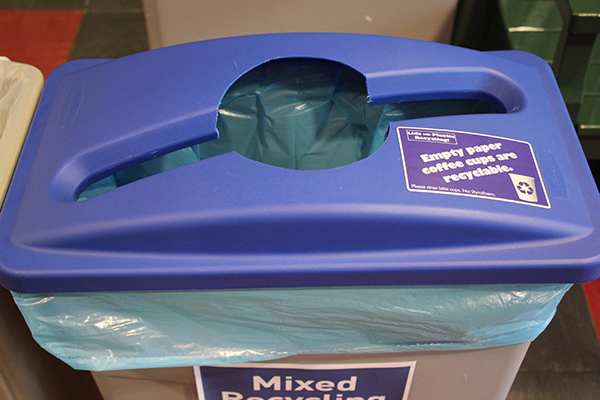Today is America Recycles Day!
To celebrate, Facilities Services and the Office of Sustainability are excited to announce the introduction of mixed recycling (single stream recycling) at the Tufts Medford/Somerville campus starting in the spring 2017 semester. The glass/metal/plastic and paper/cardboard bins on the Medford/Somerville campus will be replaced with mixed recycling bins that can be identified by their UFO-shaped lids, blue bags, and mixed recycling labels. The SMFA can look forward to seeing an increase in this style of bin in January as well.
The Cummings School and the Boston Health Sciences campus will be switched to mixed recycling in the summer of 2017.

A dual stream waste station at Tufts which includes a bin for glass/metal/plastic and a bin for paper/cardboard.
Tufts currently uses a dual stream system, which requires separating glass, metal and plastic containers from paper and cardboard items. Starting in January 2017 all these items will now be collected in one bin.
What is Mixed Recycling?
“Mixed recycling” means that the items you normally sort into the blue and green-capped recycling bins (paper/cardboard and glass/metal/plastic) can be disposed of together. Recycling materials collected will remain the same but will not need to be separated.

The UFO-shaped mixed recycling lids will allow people to dispose of items in a variety of shapes (e.g. bottles and cardboard).
Why is Tufts Moving to Mixed Recycling?
- It’s easier for you!
The ability to put paper/cardboard and glass/metal/plastic recycling in one bin will make recycling simple and easy, providing the campus community with two primary options for disposing of waste: “Mixed Recycling” or “Landfill” (along with composting for food waste in some locations).
- Our waste stream is changing
The switch to mixed recycling is a direct reaction to the changing needs of the recycling industry: with increased demand for more efficient packaging and changes in personal habits, the makeup of the nation’s waste stream is changing. At one time, paper made up to 70 percent of the weight flowing through recycling programs, but now it accounts for less than 40 percent in many cities. More complex, lightweight materials have begun to replace paper; Tufts’ mixed recycling program will accommodate the disposal of these changing materials more efficiently.
- Mixed recycling will support Tufts’ waste reduction goals
Transitioning to mixed recycling supports Tufts’ larger plan to improve solid waste and recycling efforts in line with the President’s Campus Sustainability Council’s goal of reducing total waste by 3% per year. Every Tufts community member is asked and expected to help the university meet its waste goals by educating themselves about their campus’s move to mixed recycling.


Leave a Reply